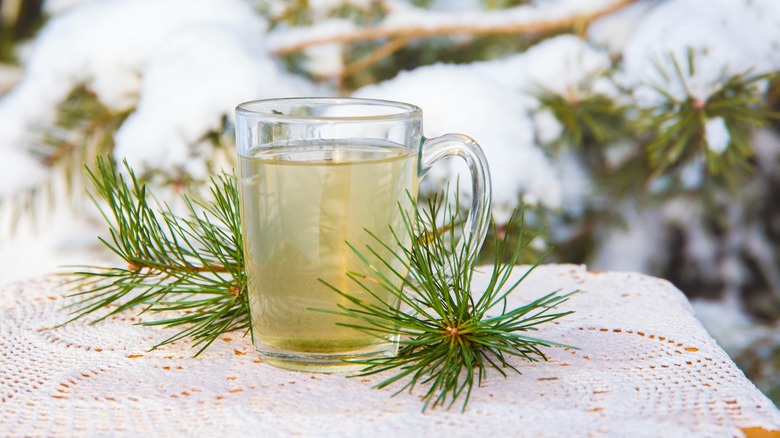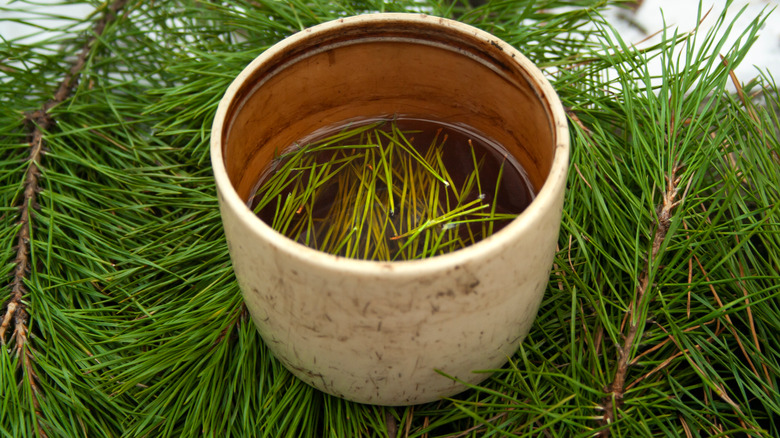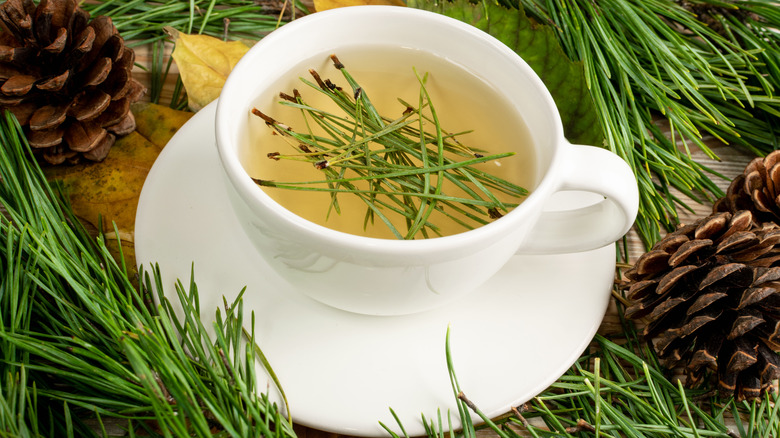Pine Needle Tea Is The Refreshing Drink You Can Make Without Going To The Store
As its name might suggest, pine needle tea is made by steeping pine needles in hot water for a flavorful, caffeine-free beverage. It's particularly popular among foodies in Korea and North America, but also enjoys a healthy fanbase in Japan, China, and Russia. There are over 100 different species of pine trees, but the needles of the Eastern white pine tree (Pinus strobus) are the most commonly used for making pine tea in North America. Korean red pine or Manchurian red pine needles are more commonly used in Korean pine needle tea-making.
The tea's flavor is piney, earthy, and slightly bitter and acidic, with subtle flavors of citrus and mint. It features a delicate light green tint and a super strong aroma. Pine needle tea is a great opportunity for cooking with foraged ingredients, but you need to know how to find the right needles. In the U.S., the three primary edible species of pine are the Eastern White Pine (Pinus strobus), Ponderosa Pine (Pinus ponderosa), and Scots Pine (Pinus sylvestris). To discern whether your pine needles are the safe kind, give 'em a good inspection. The needles should be 2-5 inches long and easily bendable. White pine needles grow in clusters (aka fascicles) of five, and Ponderosa and Scots pine needles grow in fascicles of two or three.
Pining for pine? It's easy to brew
To make pine needle tea, thoroughly clean your pine needles (whether foraged or store-bought), then steep them in freshly boiled water for up to 20 minutes (or as little as five) depending on your strength preference. A tea ball, coffee filter, or French press can all be helpful here. You could also remove the pine needles using a fine mesh strainer. If your pine needles are particularly long, they might need to be trimmed before steeping. For each cup of tea, one to two tablespoons of pine needles should do the trick; crushing them pre-steep helps release more of their flavor. Covering the steeping mug with a lid or small plate can help lock in the piney flavor. Notably, the pine needles themselves shouldn't be boiled, which will bring out the natural bitter tannins and make for an inedible taste. Boiling the needles also destroys some of their natural nutrient properties.
Younger pine needles tend to taste less bitter than older needles, but the earthiness is often sweetened with honey or simple syrup. Feel free to customize the flavor profile of your pine needle tea even further with a lemon wedge, orange wheel, cinnamon stick, star anise, peeled ginger knob, or whole cloves. Pine needle tea can also be served hot or iced. Korean sollip-cha is another, similar beverage made by sugar-fermenting the pine needles for a week or longer and is served chilled.
Stay healthy, in more ways than one
Word to the wise: Some species of conifer trees are toxic to humans, such as the cypress and common yew. Don't ingest foraged plant matter unless you're absolutely sure which type of pine needles you're gathering, and that the tree isn't growing in contaminated soil (i.e. near a highway or wastewater plant). Field guides and plant-identifying smartphone applications are terrifically useful resources to be certain. As always, only harvest as much as you intend to use at one time to avoid overstressing the tree. If foraging doesn't sound like your style, fresh pine needles can be purchased from a local herbalist shop or a variety of online retailers.
The Ojibwa, Chippewa, and Iroquois indigenous peoples of North America have long valued pine needle tea for its purported medicinal benefits, including boosting the immune system, speeding up bodily healing, stimulating circulation, promoting respiratory and ocular health, and maintaining neurological health. Even though limited research has been conducted to verify these health benefits, scientists have discovered that the lifesaving remedy served to French explorer Jacques Cartier and his dying, scurvy-stricken crew by the Iroquois people in 1536 was pine needle tea, rich in both vitamin C and arginine. At the end of the day, whether you're in it for the potential health benefits or the earthy flavor, pine needle tea can be a warming way to still your spirit, connect to your environment, and skip the hectic grocery run.


